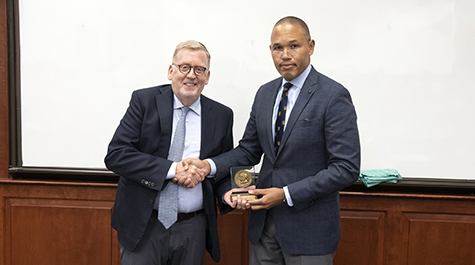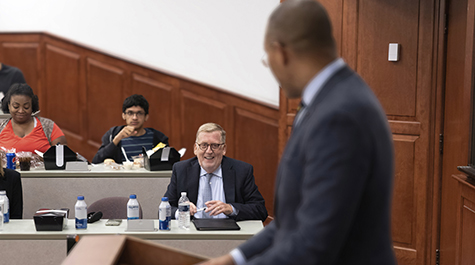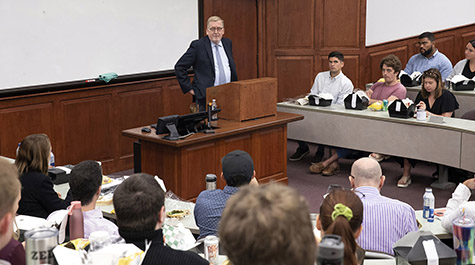William & Mary Law School Faculty Awards Marshall-Wythe Medallion to Georgetown Law’s Paul Smith
Good things come to those who wait, and after two years of Covid delay, Paul Smith of the Georgetown Law School and Campaign Legal Center has been awarded the 2019-20 Marshall-Wythe Medallion.
The medallion is the highest honor conferred by the William & Mary Law School faculty and recognizes those who have demonstrated exceptional accomplishment in law.
Smith accepted the Medallion on Monday, September 19 during a lunchtime talk in which he reflected on his career in law and fielded questions from students and faculty. Prior to that he was on hand as a panelist during the Law School’s annual Supreme Court Preview.
“We were going to celebrate in 2020, and then maybe we thought spring 2021,” said A. Benjamin Spencer, Dean and Trustee Professor of Law. “We are very excited and delighted to find we are able to recognize Professor Smith today.”
Smith has four decades of experience litigating a wide range of cases. He has argued before the U.S. Supreme Court 21 times and secured numerous victories, including in important cases advancing civil liberties. Two examples are Lawrence v. Texas, the landmark gay rights case, and Brown v. Entertainment Merchants Ass’n, which established First Amendment rights of those who produce and sell video games.
In addition, Smith has argued a number of important voting rights cases at the Supreme Court, including Gill v. Whitford and Vieth v. Jubelirer, involving partisan gerrymandering, LULAC v. Perry, involving the legality of Texas’s mid-decade redrawing of congressional districts, Crawford v. Marion County Election Board¸ involving the constitutionality of a voter identification law, and Harris v. Arizona Independent Redistricting Commission, involving a constitutional challenge to Arizona’s legislative map.
Smith previously served as a partner in the law firm of Jenner & Block, where he was chair of the firm’s Appellate and Supreme Court Practice and co-chair of the firm’s Election Law and Redistricting Practice. He is now a Professor from Practice at Georgetown University Law Center and the VP for Litigation and Strategy at the Campaign Legal Center.
“Professor Smith truly represents the epitome of the citizen lawyer ethos and the striving for excellence that we instill here at William & Mary Law School,” Spencer said. “It is my honor to present to him the very prestigious Marshall-Wythe Award and to hear reflections from him today about his extraordinary career.”
The Marshall-Wythe Medallion is named for John Marshall and George Wythe. Wythe, one of the leading statesmen of the Revolutionary Era, was William & Mary’s—and the nation’s—first professor of law. Marshall was among Wythe’s first students at William & Mary and went on to have a seminal impact on American history as the fourth chief justice of the United States.
Previous medallion recipients have included Judge Guido Calabresi, legal scholars H. L. A. Hart and William W. Van Alstyne, Judge Shirley M. Hufstedler, Judge Richard A. Posner, attorney Lloyd Cutler, Professor Robert E. Scott ’68, and numerous Associate Justices of the Supreme Court of the United States, among them William J. Brennan, Jr., Stephen Breyer, Ruth Bader Ginsburg, Thurgood Marshall, Sandra Day O'Connor, and John Paul Stevens.
“I want to say thanks for this great honor to Dean Spencer and to the faculty,” Smith said. “Seeing the list of people who have won this award is very daunting; I hope to live up to it as well as I can.”
About William & Mary Law School
Thomas Jefferson founded William & Mary Law School in 1779 to train leaders for the new nation. Now in its third century, America’s first law school continues its historic mission of educating citizen lawyers who are prepared both to lead and to serve.


